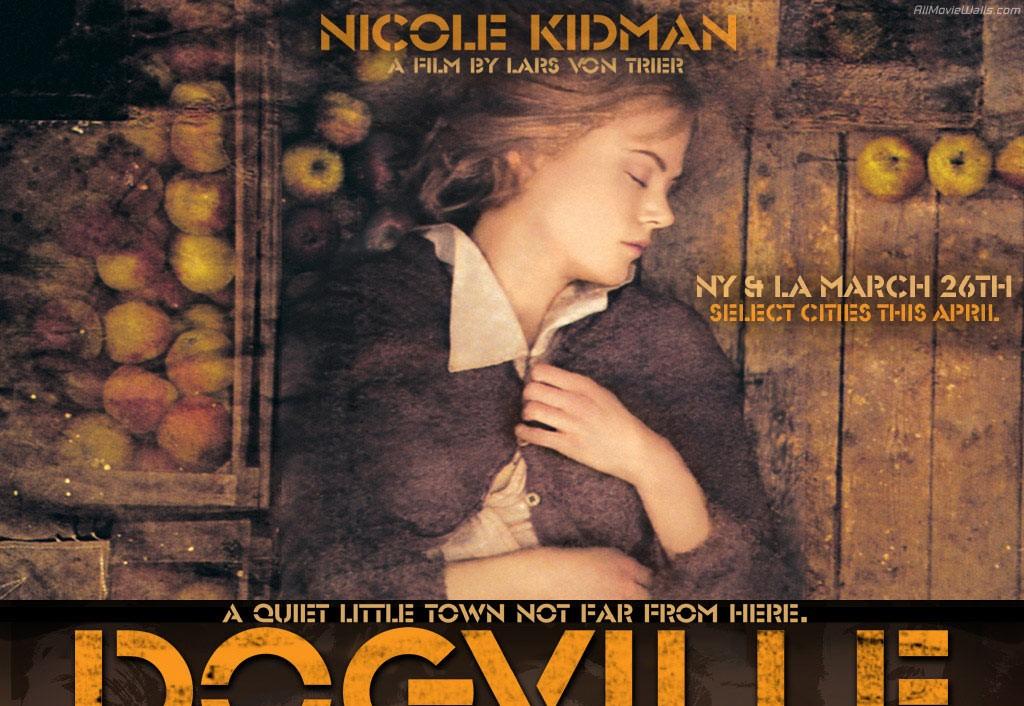
An elm street without elms, a few small homes, a small church, a small jungle, and a mountain road leading to another town make up the "dog town".
The Danish film Dogtown successfully combines elements of stage plays and films. The film opens with a bird's-eye view showing the floor plan of Dogtown. Director and screenwriter Russ von Trier did not use real scenes, but chose sets, and reduced the sets to the simplest.
Several white lines on the ground divided the streets and cottages, and the houses had no walls and roofs, only some simple furniture. The characters enter and exit the house through "the invisible door." Each household seems to have its own private space, but in fact, what separates them is only some "imaginary intervals".
The boundaries between private and public spaces become blurred and floating, but the perspective of the space is enhanced. A most unabashed, naked environment. This experimental style provides another dimension of space, making the stage effect more obvious and subverting the conventional mode of expression of the film.
<h1 class= "pgc-h-arrow-right" > fragile human values</h1>
When one's own interests are threatened, "trust" and "friendship" become fragile. Dogtown is located in the Rocky Mountains of the United States, with bright scenery, sparse population, simple life and friendship.
One day, a single and unarmed woman, Grace (Nicole Kidman), flees to Dogtown to escape the gang and meets Tom.
The benevolent Tom decides to take her in the town and, as a writer and philosopher, gives everyone a lesson on "acceptance" and persuades people to let Grace stay. The pitiful Grace gradually gained the trust of the residents and won their friendship.
However, when the police wanted Grace was issued in the town, these values were also challenged. The first wanted warrant has not yet shaken the townspeople, but the second wanted warrant has made them hostile to Grace. Each person is pregnant with a ghost, and it turns out that the so-called trust, friendship or acceptance of people is only based on self-centeredness and self-satisfaction.
<h1 class = "pgc-h-arrow-right" > corrupts people's minds</h1>
The film seems to confirm once again the claim that "power corrupts the human heart". When Grace gets dogtown residents to take her in, she hopes to do something for them in return. She is willing to give herself as a gift (echoing her name, Grace), to help everyone.
At first, the inhabitants had little work to give Grace, because they didn't have much to do on their own, but they were willing to try to get Grace to share only their work. She helps Vera take care of and teach a few children, make some at Jane's shop, be a listener to Blind Jack, etc.
But as the days passed, Grace's labor was taken for granted and seen as a favor that people gave Grace. When the inhabitants have the privilege of using and manipulating Grace, the original friendliness and kindness are also eroded by power. Grace gradually became the property of the residents, and she was no longer herself.
They tend to abuse grace and begin to do whatever graces grace with Grace: Jane is critical of her, Jack takes advantage of her, Vera's husband Chuck rapes her, and Vera falsely accuses her of seducing her husband.
Grace becomes a tool of sexual lust/jealousy for the men/women of the town (which may echo grace/Nicole Kidman's mysterious, charismatic and fetishized image), and finally the villagers simply put shackles on Grace to prevent her from escaping.
The dogtown that made Grace feel friendly and cordial at first is gone, and a small but complete system begins to collapse after Grace's "inducement" appears. Her sincerity, gentleness and smile did not end well in the end.
As the director of the film once explained, the treatment of Grace by the townspeople is a good point: when you put yourself in front of people as a gift, it is quite dangerous. The danger of Grace's "automatic devotion" is that it has been greatly damaged.
<h1 class="pgc-h-arrow-right" > dog town or human? </h1>
▲ Nicole Kidman
Although the film's dogtown is located in the United States, the director said that it depicts not just American traits, but a universal humanity. Not only is this the case in dog towns, I am afraid that this is also the case everywhere in the human world.